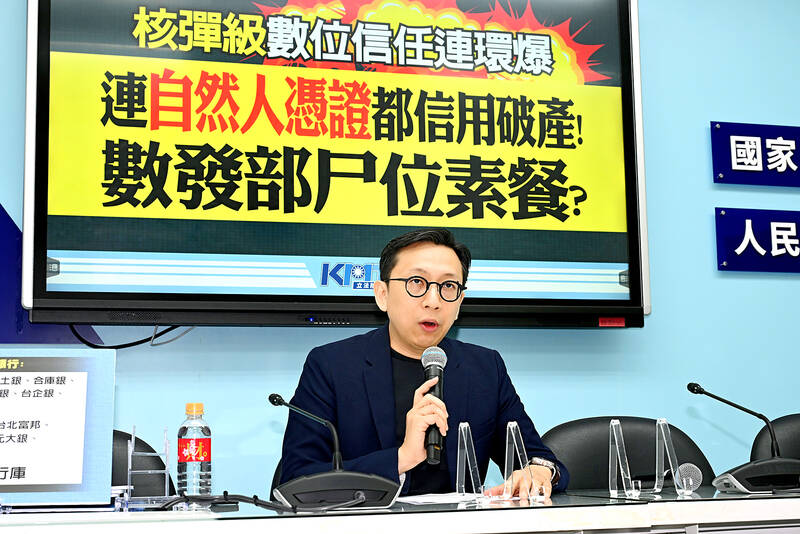The government’s poor response to abuse of its digital ID system highlights its inability to efficiently handle cybersecurity issues and is exposing the public to great risks, Chinese Nationalist Party (KMT) Legislator Ko Ju-chun (葛如均) said yesterday.
The government has promoted the Natural Person Certificate system as a critical infrastructure for e-governance, with about 8 million of the digital certificates issued and half that in use, Ko said.
However, among bank accounts flagged as “watched,” four times as many were opened using a Natural Person Certificate than were opened using other forms of identification, Ko said, citing Financial Supervisory Commission (FSC) data.

Photo: Chen Yi-kuan, Taipei Times
Scammers might be tricking many people into divulging their information, allowing them to fraudulently apply for the certificates and use them to open bank accounts, he said.
At least 17 banks, state-owned and private, have suspended the use of the certificates as identification, he said.
The government’s response has been absurd, including suggesting that people turn off digital messaging services, setting limits on fund transfers, and asking banks to suspend withdrawals and transactions for accounts that have been inactive for half a year, he said.
The government’s inability to offer solutions — while oppressing the KMT, which is providing oversight — shows that that it is not trustworthy, Ko said.
The passage of the Electronic Signature Act (電子簽章法) last year means that the government should have introduced other security measures, such as the Fast Identity Online standard, multifactor authentication, biometrics or limiting operations to bound cellphones, he said.
Instead, the Ministry of Digital Affairs, the Ministry of the Interior, the FSC and the National Police Agency are passing the buck and no action has been taken, he said.
The government has other things to worry about in its digital governance, he said.
On May 30, a Google Security Blog post outlined how Chrome had lost confidence in the reliability of Chunghwa Telecom as a certification authority, meaning the Web browser would soon start issuing warnings when people visit government sites, he said.
Meanwhile, Dire Wolf, a hacker group, claimed credit for a breach of Kiwi86’s servers and is holding ransom 20GB of the insurance system service provider’s data, he said.
The public cannot trust the state-sponsored digital ID system, which creates a lack of security and undermines any further attempts to establish digital autonomy, Ko said.
Government agencies should stop promising lots and delivering little, and instead do their jobs, which is to make Taiwan a haven for digital technology developers, not scammers, he added.

Alain Robert, known as the "French Spider-Man," praised Alex Honnold as exceptionally well-prepared after the US climber completed a free solo ascent of Taipei 101 yesterday. Robert said Honnold's ascent of the 508m-tall skyscraper in just more than one-and-a-half hours without using safety ropes or equipment was a remarkable achievement. "This is my life," he said in an interview conducted in French, adding that he liked the feeling of being "on the edge of danger." The 63-year-old Frenchman climbed Taipei 101 using ropes in December 2004, taking about four hours to reach the top. On a one-to-10 scale of difficulty, Robert said Taipei 101

Nipah virus infection is to be officially listed as a category 5 notifiable infectious disease in Taiwan in March, while clinical treatment guidelines are being formulated, the Centers for Disease Control (CDC) said yesterday. With Nipah infections being reported in other countries and considering its relatively high fatality rate, the centers on Jan. 16 announced that it would be listed as a notifiable infectious disease to bolster the nation’s systematic early warning system and increase public awareness, the CDC said. Bangladesh reported four fatal cases last year in separate districts, with three linked to raw date palm sap consumption, CDC Epidemic Intelligence

US climber Alex Honnold left Taiwan this morning a day after completing a free-solo ascent of Taipei 101, a feat that drew cheers from onlookers and gained widespread international attention. Honnold yesterday scaled the 101-story skyscraper without a rope or safety harness. The climb — the highest urban free-solo ascent ever attempted — took just more than 90 minutes and was streamed live on Netflix. It was covered by major international news outlets including CNN, the New York Times, the Guardian and the Wall Street Journal. As Honnold prepared to leave Taiwan today, he attracted a crowd when he and his wife, Sanni,

Taiwanese and US defense groups are collaborating to introduce deployable, semi-autonomous manufacturing systems for drones and components in a boost to the nation’s supply chain resilience. Taiwan’s G-Tech Optroelectronics Corp subsidiary GTOC and the US’ Aerkomm Inc on Friday announced an agreement with fellow US-based Firestorm Lab to adopt the latter’s xCell, a technology featuring 3D printers fitted in 6.1m container units. The systems enable aerial platforms and parts to be produced in high volumes from dispersed nodes capable of rapid redeployment, to minimize the risk of enemy strikes and to meet field requirements, they said. Firestorm chief technology officer Ian Muceus said